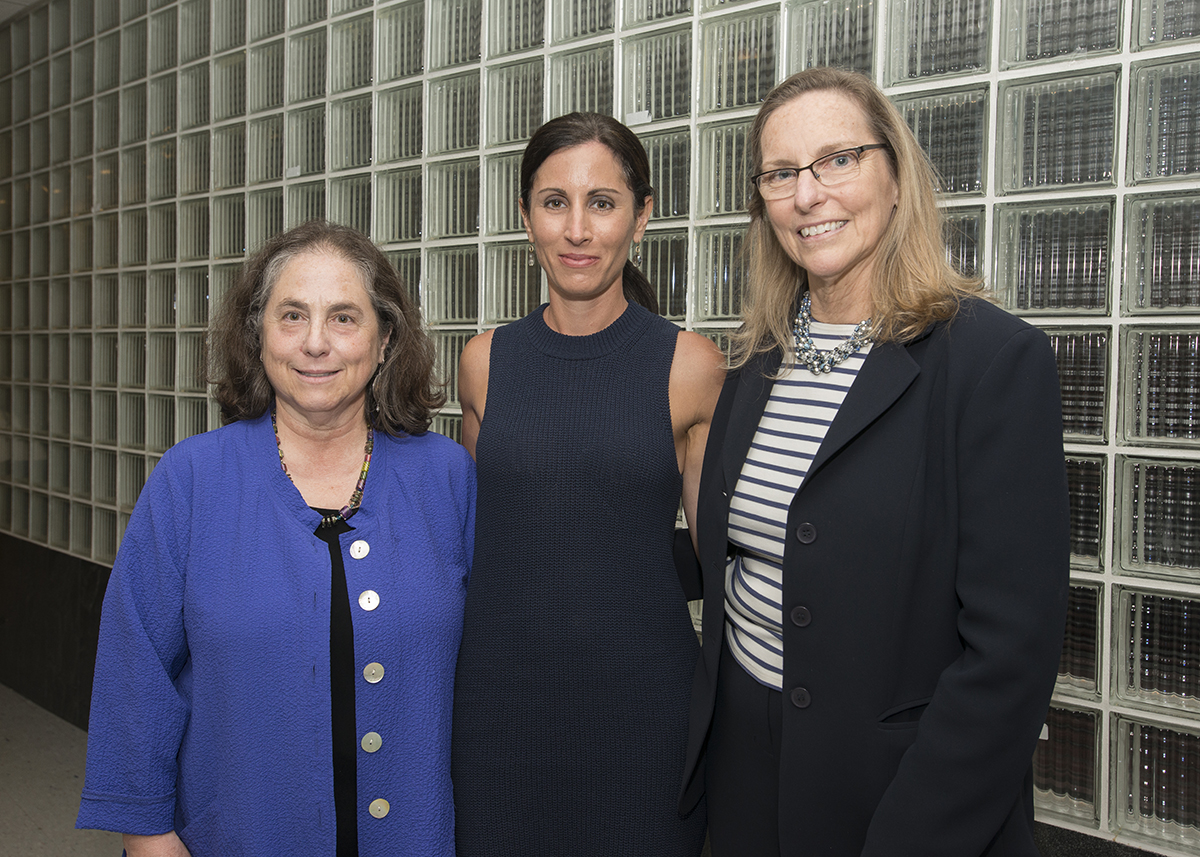Q&A: Still Alice Author Lisa Genova

Barbara Moscowitz, director of geriatric social work at MGH; Lisa Genova; Dr. Cornelia Cremens, MGH physician in senior health. Photo provided to bostonmagazine.com
Before Still Alice was a major Hollywood movie, it spent years as a pipe dream in the back of author Lisa Genova’s mind.
Inspired to humanize Alzheimer’s after watching her grandmother struggle with the mind-robbing disease, the Harvard-educated former neuroscientist wrote Still Alice after quitting her job to have her daughter in 2000. Today, she’s parlaying the success of the best-selling novel and the Oscar-winning movie it inspired into a chance to raise compassionate awareness about Alzheimer’s.
We caught up with Genova Tuesday, who was in town to speak at Massachusetts General Hospital, about her book, the inspiration behind it, and the future of Alzheimer’s:
What is your personal connection to Alzheimer’s?
This all began with my grandmother, who had Alzheimer’s. She was diagnosed in her mid-80s, and she probably had Alzheimer’s for maybe 10 years leading up to that, but we as a family were like a lot of a families in that we were in denial. We assumed that forgetting was a normal part of normal aging. By the time we all figured out it was actually Alzheimer’s, she was pretty far along in the progression of the disease.
I learned a lot of information that helped us as caregivers, but the piece of information that was missing was, what does it feel like to have this? I could understand the molecular neurobiology of Alzheimer’s by reading the science, [but] this question of, what does it feel like to have it from the perspective of the person who has Alzheimer’s, was the seed for Still Alice.
Is that why you chose to write a novel instead of a non-fiction work?
Everything I had read was non-fiction, and the information felt intellectual. It was like a cerebral exercise and what I wanted to do was feel it. I came to know 27 people who have early onset and early stage Alzheimer’s, and as I came to know them, I recognized that I had both a responsibility and an opportunity to give them a space and a voice. I wanted to capture what the essence of having Alzheimer’s might feel like for anyone.
I think the general public’s perception of this disease, which was certainly mine back when my grandmother had this, is Alzheimer’s is a disease of the dying elderly. So one of the things I wanted to write about was, what does living with Alzheimer’s look like and sound like and feel like? It’s less scary when you can begin to think about living with Alzheimer’s, rather than dying with Alzheimer’s.
Was it difficult transitioning from a career in science to being an author?
When my daughter was 3, I was separated and divorced. In the upheaval of that really unexpected, heartbreaking life change for me, I was very worried about what my life would look like next. The tone switched and it became sort of an interesting, almost exciting opportunity. If I could do anything I wanted and I didn’t have to care what anybody thought of me, what would I do? My answer, which was the truth I could not talk myself out of, was, you need to write the novel.
What was it like to see the book turn into major movie?
It was insanely surreal. [At first] I couldn’t get Still Alice published. I self-published it in the summer of 2007 and I sold it out of the trunk of my car for 10 months before it sold to Simon & Schuster. So to be at the Oscars and to watch Julianne Moore win, it was completely mind-blowing because it could have been in my drawer.
What is your hope for Still Alice’s impact?
Alzheimer’s affects 5.4 million Americans, and those numbers are going to skyrocket because of the Baby Boomer population [aging]. It’s staggering, and it’s going to bankrupt our healthcare system if we don’t do something about this—but not a lot of money goes into Alzheimer’s.
People who have Alzheimer’s have been marginalized and excluded from the community because everybody’s afraid of this disease. It reminds me so much of what cancer used to be, when no one would even say the word. In order to get Alzheimer’s survivors, we need to talk about it. And I think the book and now the movie provide a vehicle—a safer, more palatable way for people to begin to talk about this. Alzheimer’s doesn’t have to look like somebody who’s 90 years old and dying in a nursing home; it can look like Julianne Moore.
And now you’re doing public speaking to keep the conversation going?
Absolutely. When I was younger I imaged that I would be a neuroscientist who would make discoveries that would be part of the body of knowledge that would lead to treatments and cures. And now I’m a novelist, which is really odd, and yet I like to think that part of what I’m doing is generating the compassionate awareness that will lead to funding that will help those scientists get to those answers. I’m still part of the progress.
*This interview has been edited and condensed.


